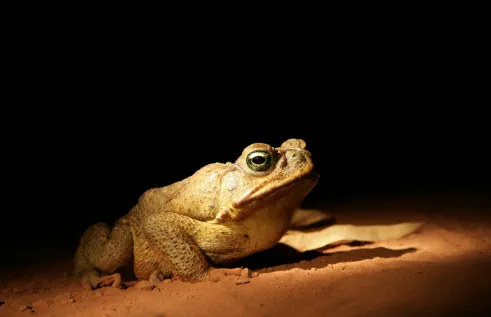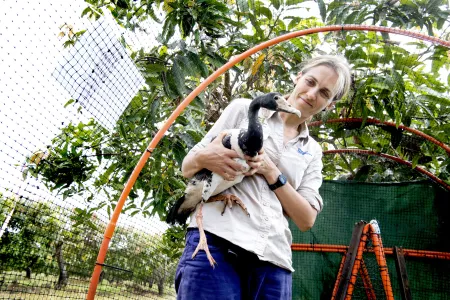News
Latest research finds magpie geese resist allure of NT mango madness
Research from Charles Darwin University (CDU) has identified opportunistic feeding behaviours of magpie geese across the Top End, with new solutions to improve management of the iconic bird as the Territory heads into peak mango season.
Magpie geese are protected wildlife and a symbolic animal in the Northern Territory , but they can also pose a challenge to local agriculture as they feed on seasonal crops and cause financial losses.
Dr Amélie Corriveau from the Research Institute for Environment and Livelihoods found that magpie geese consume crops when there is an opportunity to, rather than specifically seek out farms for optimal food sources.
“We used DNA metabarcoding to identify the contents of magpie goose diets and understand how the birds are feeding across the Greater Darwin region,” Dr Corriveau said.
The lead author’s latest study was published this month and investigated the relative contribution of agricultural and natural food sources to goose diet during the Top End’s late dry season.
“Their diets contained both natural plant food sources, and agricultural crops like mangoes. The geese don’t necessarily target mangoes, but rather farms are located within their seasonal feeding grounds.”
The pervasive problem of conflicting feeding grounds expands across the Top End.
“Magpie geese tend to return to the same general areas in the Top End each year, so working with local farmers and environmental authorities to understand feeding behaviours could reduce the impact on peak season crops and improve species management,” she said.
“Farmers could minimise the appeal of their fields with shorter grass or alternative ground cover. On the other hand, providing more protected nature reserves as alternative foraging areas could benefit the long-term conservation of geese, while possibly reducing the pressure on valuable crops.”
Dr Corriveau’s colleague Professor Stephen Garnett said the research shows a deeper understanding of magpie goose feeding behaviours to aid joint conservation efforts.
“Amelie’s work is important because it shows that the mangoes are not essential to the geese, even though they like them,” Professor Garnett said.
“That means taking mangoes off the goose menu will do the geese no harm. It also means that there is real potential to reduce conflict between the geese and farmers, if the geese are managed cooperatively across the rural landscape.”
The research was published in the Journal of Applied Ecology, and funding from Hort Innovation and the Mango Fund was awarded to Professor Hamish Campbell and Charles Darwin University.
Related Articles

First “hype cycle” of AI development put tech above humans
Users around the world have rushed to adopt artificial intelligence - especially in safety-critical fields - but a new study has revealed the hype has prioritised technology for technology’s sake instead of human-centred development.
Read more about First “hype cycle” of AI development put tech above humans
Nanoplastics hindering cognitive abilities of fish, international research shows
Nanoplastic exposure can impair the cognitive abilities of fish and could lead to significant impacts on marine species’ ability to survive, according to a new international study.
Read more about Nanoplastics hindering cognitive abilities of fish, international research shows
Eradication would cost billions: NT’s lessons for Pilbara’s cane toad management
Cane toads are predicted to invade Western Australia’s Pilbara region by 2041 if left unchecked, but the Northern Territory’s population of the pests hold key lessons that could save billions in eradication costs.
Read more about Eradication would cost billions: NT’s lessons for Pilbara’s cane toad management
